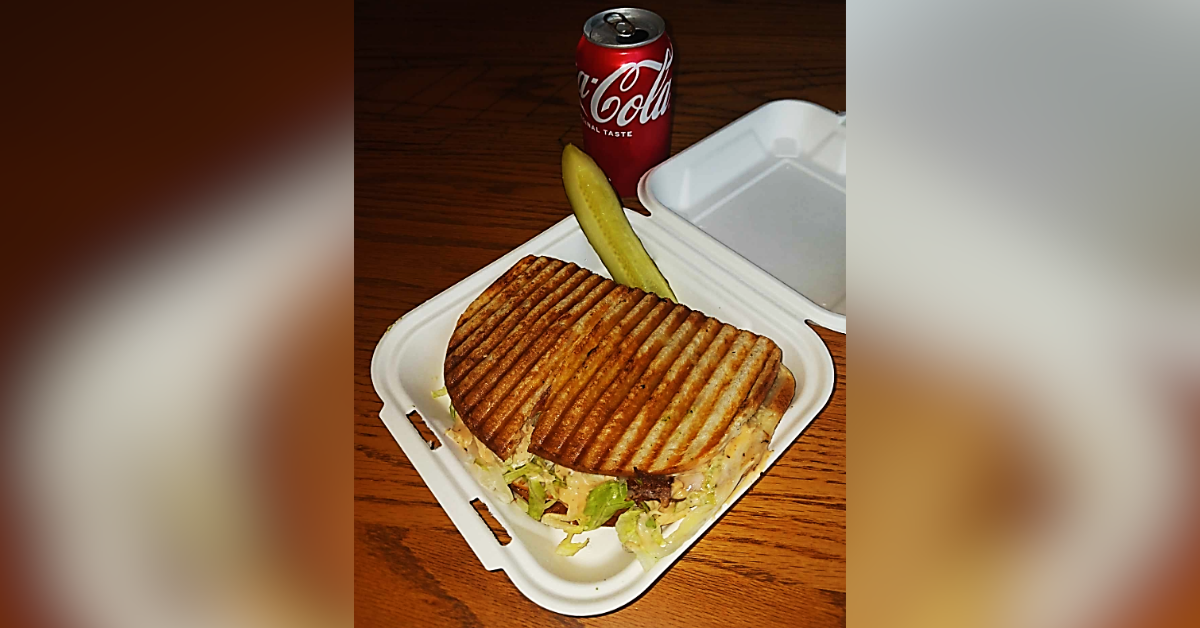Navigating the challenges of college life can be particularly daunting for those accustomed to the comforting presence of pets at home. Such is the case for Jessi, a freshman from Maple Valley, Washington, majoring in exercise science, and Makenna, a freshman from Omaha, Nebraska, majoring in English with a business minor. Missing the companionship of their dogs back home, Jessi and Makenna decided to bring a new furry friend into their lives at UIS, aiming to combat homesickness, loneliness, and the inevitable difficulties of college life.
After extensive meetings with various dogs, the duo found their perfect match in Mango, a delightful three-year-old female boxer/mastiff with the appearance of a pitbull. The selection process involved thorough research, considering Mango’s breed, personality, trainability and compatibility with their lifestyles. She would make a perfect emotional support animal.
Mango’s status as a female dog was essential to ensure harmony with Makenna’s existing pet back home. Furthermore, they prioritized traits such as a non-barking disposition and being potty trained, making Mango an ideal fit for their on-campus living.
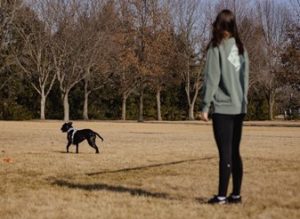 When they first moved into Lincoln Residence Hall, they checked in with their RA who informed them about the possibility of having an ESA on campus. Indeed, UIS allows animals on campus under specific guidelines. Jessi and Makenna’s process faced some obstacles first with their parents and then, as Jessi is an out-of-state student and she formally requested and signed the form, with an in-state doctor’s referral. After a couple of stressful days due to
When they first moved into Lincoln Residence Hall, they checked in with their RA who informed them about the possibility of having an ESA on campus. Indeed, UIS allows animals on campus under specific guidelines. Jessi and Makenna’s process faced some obstacles first with their parents and then, as Jessi is an out-of-state student and she formally requested and signed the form, with an in-state doctor’s referral. After a couple of stressful days due to 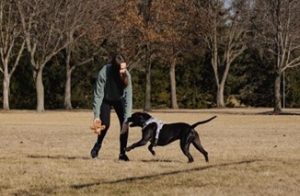 bureaucratic processes between doctors and the pound, the Office of Disability Service helped to make sense of the situation and eventually approved their request in a few hours, allowing Mango to officially join them at UIS on October 19, 2023.
bureaucratic processes between doctors and the pound, the Office of Disability Service helped to make sense of the situation and eventually approved their request in a few hours, allowing Mango to officially join them at UIS on October 19, 2023.
Makenna’s willingness to care for Mango during breaks, given the considerable distance to Jessi’s out-of-state home, demonstrated a remarkable support system. Leaving UIS and driving to Makenna’s home in Nebraska was never a problem. Mango slept the whole journey and she also got along well with Makenna’s dog at home.
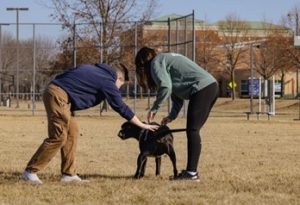 “I am so thankful to have such a flexible and understanding roommate as I have,” Jessi explained. “Makenna has been amazing with helping take care of Mango as well as helping throughout the adoption process.” Jessi went on to say that “while Mango is ‘my’ ESA and the paperwork here is under my name, Mango is just as much Makenna’s dog as she is mine.”
“I am so thankful to have such a flexible and understanding roommate as I have,” Jessi explained. “Makenna has been amazing with helping take care of Mango as well as helping throughout the adoption process.” Jessi went on to say that “while Mango is ‘my’ ESA and the paperwork here is under my name, Mango is just as much Makenna’s dog as she is mine.”
Mango’s presence has not only alleviated homesickness and loneliness but has also become a source of personal motivation and self-care for Jessi and Makenna. Because of her, Jessi and Makenna no longer miss the sense of responsibility and the comforting company that dogs provide. Mango has become a crucial part of their daily routine.
source of personal motivation and self-care for Jessi and Makenna. Because of her, Jessi and Makenna no longer miss the sense of responsibility and the comforting company that dogs provide. Mango has become a crucial part of their daily routine.
Jessi and Makenna’s commitment to taking care of Mango is clear from a mile away. Mango’s first morning walk is usually at 8:00 a.m. Then, Mango has her breakfast and waits for them to come back from class, around 11:00 a.m., where she gets to go for another playful and longer walk. When weather allows, they walk to Lincoln Land Community College, which is about 45 minutes round trip, or play off leash at the public soccer fields past the townhouses. Before soccer practice, Jessi and Makenna take Mango out for a quick 10-minute walk. After practice, it’s dinner time for Mango and then it’s time for another walk. The last walk usually happens around 10 p.m., before they all go to sleep and get ready to spend other joyful days with Mango.
come back from class, around 11:00 a.m., where she gets to go for another playful and longer walk. When weather allows, they walk to Lincoln Land Community College, which is about 45 minutes round trip, or play off leash at the public soccer fields past the townhouses. Before soccer practice, Jessi and Makenna take Mango out for a quick 10-minute walk. After practice, it’s dinner time for Mango and then it’s time for another walk. The last walk usually happens around 10 p.m., before they all go to sleep and get ready to spend other joyful days with Mango.
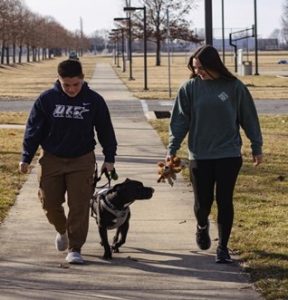 “The best part about having Mango is that she is a very good comfort dog,” Makenna said. “She loves attention, so she is a nice cuddly friend to come back to in the dorm every day.” Moreover, Mango seamlessly integrated into campus life, forming a friendly bond with Rico, another dog residing on their floor.
“The best part about having Mango is that she is a very good comfort dog,” Makenna said. “She loves attention, so she is a nice cuddly friend to come back to in the dorm every day.” Moreover, Mango seamlessly integrated into campus life, forming a friendly bond with Rico, another dog residing on their floor.
The story of Jessi, Makenna and Mango exemplifies the transformative power of companionship during the challenging transition to college life. The dedication and care they invest in Mango not only contributes to the well-being of the three of them but also underscores the importance of understanding and embracing the emotional support that animals can provide in a university setting.




